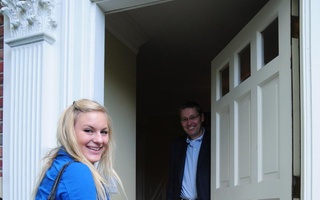In the first lecture of his introductory economics course, professor N. Gregory Mankiw claimed that one of the three reasons you should take his class is “to get rich.”
Mankiw’s course boasts an enrollment of 711 students.
Over the past few years, countless studies and articles have been published trying to determine whether or not college provides a worthy, concrete, monetary return on investment. Many prominent magazines and intellectual thinkers have come to the same conclusion: College is often a waste of money.
But at Harvard—where the two most popular classes are introductory courses in economics and computer science, and the average alum makes over $120,000 annually by the middle of her career—we should be asking the opposite question: Does Harvard do anything but prepare students financially?
Harvard clearly and effectively combats the idea that a college education (at least one at Harvard) harms one’s economic prospects. Even Paypal co-founder Peter Thiel, who famously argues that higher education is a bubble, agrees that the few schools with brands like Harvard offer “insurance they don’t offer anywhere else.” And this would all be fine if Harvard did not claim to be something more.
But it does.
In my first week here, I attended a mandatory community discussion on “why liberal education matters,” listened to a convocation speech from Dean of the College Rakesh Khurana on making sure that Harvard freshmen do not focus “on the material goal,” and heard from parents, professors, and administrators alike that college is a time to explore—that I should not yet know what I am going to concentrate in or what classes I want to take.
But in spite of the fact that Harvard seemingly goes out of its way to foster an environment in which students pursue the academic areas that interest them—and in spite of the fact that Harvard is one of the only schools in the country where even skeptics like Peter Thiel remain confident students will make back the money they invest in their education, regardless of major—the classes Harvard freshmen choose to take, by and large, are ones that follow a path to Wall Street or Silicon Valley.
There are several reasonable explanations for the dissonance between Harvard’s students and faculty on the merit of a liberal arts education. Perhaps Harvard students genuinely fear they will be unable to support their families with a degree in the humanities (having failed to account for the fact that a degree at Harvard, unlike one from most schools, is almost always going to be cost effective). It is also entirely possible that students at Harvard are just more interested in mathematical subjects like economics or computer science than they are with the arts. Or, more ominously, the type of students Harvard attracts these days are the success-driven, results-oriented machines so-often mocked by critics of the cutthroat Ivy League application process, and to those students, economics and computer science seem like logical next steps in a calculated approach to schooling.
Regardless of the reasoning, these students are missing out.
At Harvard—where future economic security is not much of a question—college can and should be much more than a stepping stone to the workplace. Instead, college should be a time when students grow up: try new things, gain independence, and come into contact with people from all over the world.
As Steve Jobs, who credits a calligraphy class with his inspiration for bringing personal computers “multiple typefaces [and] proportionally spaced fonts,” said, “You cannot connect the dots looking forward… You can only connect them looking backwards.”
Peter Thiel probably did not imagine that majoring in 20th century philosophy in college would set him up to be a billionaire. Lloyd Blankfein ’75 concentrated in government on his way to law school—not something that usually results in becoming the CEO of Goldman Sachs. And Mitt Romney’s English major at BYU did not exactly have CEO of Bain Capital or governor of Massachusetts written all over it.
All this to say: do not start connecting the dots as a freshman. Take classes because they are enriching and stimulate your mind. And then, after exploring these classes—engaging in topics that interest you, taking risks, following your passions—maybe you’ll decide to set foot in Mankiw’s class, because what you really want is to “get rich” after all. And, hey, with classes in a wide-range of subjects under your belt, you’ll be even better equipped to do just that.
Sam H. Koppelman ’18, a Crimson editorial comper, lives in Hollis Hall.
Read more in Opinion
The Fantasy of 100% Renewable EnergyRecommended Articles
-
Economics Professors Push Safe Investing StrategiesLike most of the investment community, Harvard’s vaunted economists were hit hard by the recent financial crisis and ensuing downturn.
-
 FM Cribs Presents: N. Gregory Mankiw
FM Cribs Presents: N. Gregory Mankiw -
 Mankiw Touts Economics
Mankiw Touts Economics -
Mankiw Named Chair of Economics DepartmentEconomics professor N. Gregory Mankiw, head of the popular introductory course Economics 10: Principles of Economics and adviser to presidential candidate Mitt Romney, will take over as chair of the economics department starting on July 1. He will replace professor John Y. Campbell, who is wrapping up a three-year term as chair.













